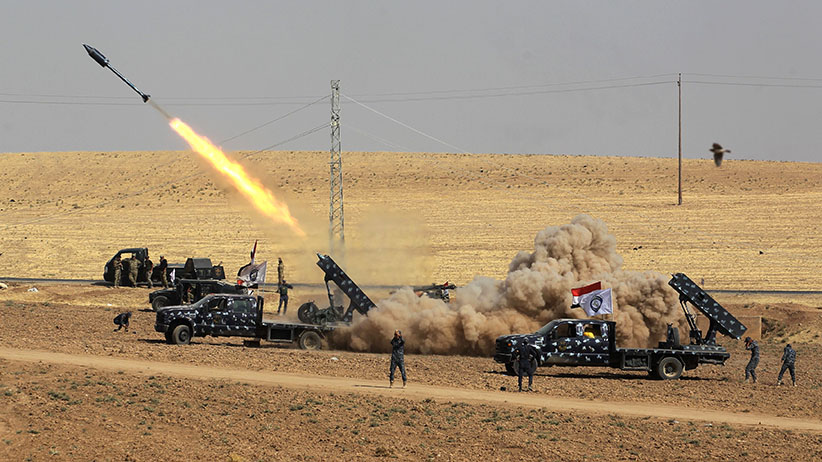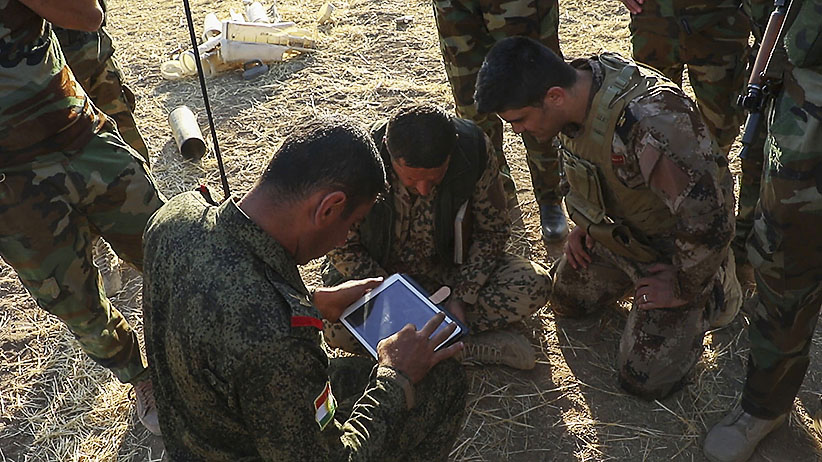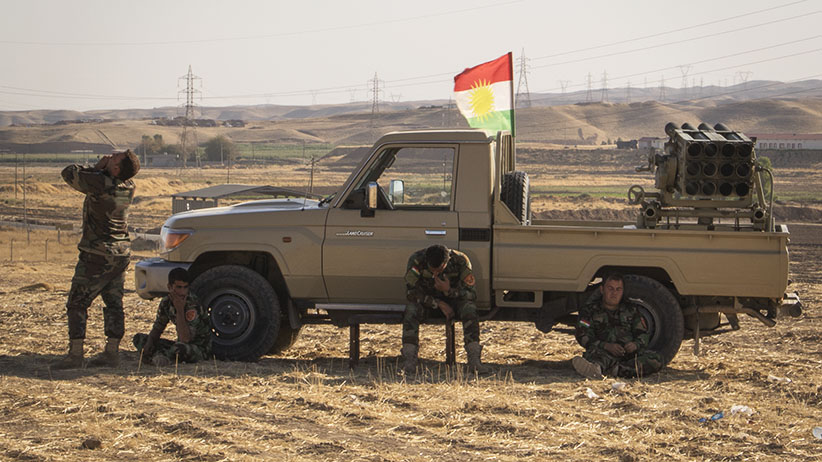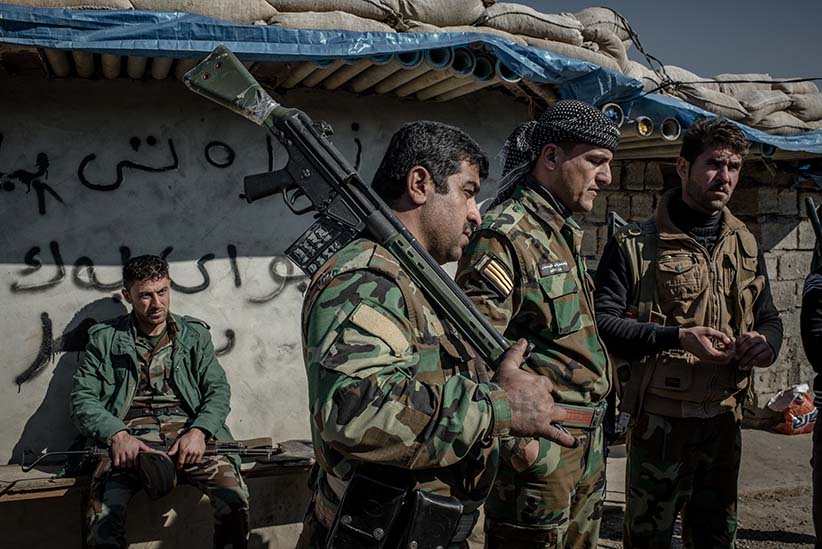How the fight to defeat ISIS sparked a new battle in Iraq
Adnan R. Khan: Canada put its military resources behind the Kurds to take on ISIS. Now it’s seeing the ugly results.
A picture taken on October 26, 2017 shows rockets being launched from Iraqi security forces’ against Kurdish Peshmerga positions in the area of Faysh Khabur, which is located on the Turkish and Syrian borders in the Iraqi Kurdish autonomous region. (AHMAD AL-RUBAYE/AFP/Getty Images)
Share

In the pre-dawn hours of Oct. 20, convoys of armoured vehicles, some of them belonging to the Iraqi army, others to Iranian-backed Shia militias, converged on Altun Kopri, a town straddling the banks of the Little Zab River in northern Iraq, less than 50 km south of the Kurdistan Region’s capital, Erbil.
The Iraqis, armed with U.S.-supplied weapons including M1A1 Abrams tanks, artillery pieces, mortars and assault rifles, were a formidable force. Less than two weeks earlier, they had delivered a death blow to the so-called Islamic State’s presence in Iraq, routing its fighters from its last major stronghold in Hawija.
The fighters, some of them trained by U.S. special forces, others by Iran’s notorious Revolutionary Guard Corps, were now turning their sights on a new enemy—their one-time allies in the war on ISIS, Iraq’s Kurds.
A month earlier, the Kurdistan Regional Government had followed through on its plan to hold a referendum on independence from Iraq, despite warnings from Baghdad. The referendum, as much as it was an expression of the decades-old Kurdish desire for an independent homeland, was also a de facto annexation of Kirkuk, a province the Iraqi army had lost to ISIS in 2014 and whose petrodollars would ensure the economic viability of any future Kurdish state.
READ MORE: A whole new war is about to hit Iraq
On the opposite bank of the Little Zab, Kurdish Peshmerga forces had set up defensive positions on two mesas overlooking Altun Kopri and dug in behind hastily constructed dirt berms on its northern outskirts. They were led by the Zeravani commandos, an independent branch of the Peshmerga trained by Canadian special forces and loyal to one of the main Kurdish political parties, the Kurdistan Democratic Party (KDP).
The Zeravani had something to prove. Days earlier, they had been driven out of Kirkuk by the Iraqi army, caught by surprise and betrayed by a rival Kurdish political group in what was an embarrassing blow to the KDP. The “act of treason,” as some KDP politicians described it, was not the first time Iraq’s Kurds had turned on each other. Though largely united in their desire for a homeland, internal power struggles have threatened to divide the region, and on one occasion sparked a civil war.
The international community, obsessed with defeating the ISIS militants at all costs, had focused much of its training and support on these KDP fighters, seemingly unconcerned about simmering internal struggles. In April 2016, Gen. Jonathan Vance, Canada’s chief of the defence staff, promised to transform the Zeravani into an elite “commando” force.
But when the fighting began in Altun Kopri, it was fierce but short-lived. Iraqi forces, more experienced and much better equipped, easily secured the town. The Zeravani held their defensive positions but were unable to force the Iraqis to retreat.

When Maclean’s attempted to reach the front, the battle had shifted from direct conflict to passive bombardment. The Peshmerga launched rockets and mortars, destroying what they described as a U.S.-supplied tank; the Iraqis responded with their own volleys, accusing the Kurds of firing on them with German-supplied anti-tank missiles.
Rounds whistled overhead, landing with bone-jarring explosions in front, behind and on both sides of the Toyota four-by-four ferrying this reporter to the front. The vehicle was forced to turn back, racing past Zeravani fighters heading in the opposite direction.
Less than two weeks after the war against ISIS in Iraq ended, a new battle was on, a conflict many had cautioned was inevitable and predictable. The international community had picked its proxies, eagerly pouring weapons and expertise into a tinderbox with little thought as to how they might be used in the future.
Only months earlier, Iraqi forces and the Zeravani had appeared to be on good terms. Maclean’s accompanied the Golden Division, Iraq’s equivalent of the Zeravani, into Mosul, and visited Zeravani front-line positions in the fight against ISIS. The relationship between the two was, if not cordial, at least tolerant. Golden Division commanders regularly dropped by Zeravani bases to share information and, on occasion, cups of tea. The Iraqis and Kurds were allies. Both felt empowered by the central role they were playing in battling a terrorist group universally despised and feared.
But behind the camaraderie there were tensions. Ever since Canada had joined the Global Coalition to Defeat ISIS after the Islamic State overran Mosul in June 2014, it found itself caught in the middle of Iraq’s volatile ethnic and sectarian divides. While the Conservatives committed Canadian special forces, fighter jets and other matériel to the coalition, Canada’s ambassador to the region, Bruno Saccomani, a close ally of Stephen Harper, took the lead on developing Canada’s on-the-ground response.
For the Conservatives, the KDP and the ruling Barzani family were the ideal beneficiaries of Canada’s largesse. Saccomani had reportedly developed close ties to them. Warnings from diplomats and local politicians that Canada was picking sides and stoking rivalries were largely dismissed. The 69 special forces trainers dispatched to Iraq in September 2014 embedded with the KDP-aligned Zeravani forces in large part because Canada’s war planners had determined they would be best placed to fight ISIS.
READ MORE: 2014-2017: An obituary for ISIS
After the 2015 federal election, the Liberal government continued with the Conservative policy, arguing in an email to Maclean’s that “a number of top officials of the Kurdistan Regional Government, including the president and the prime minister, are from the Kurdistan Democratic Party.” Nurturing a close relationship with them and in turn the Zeravani was “entirely appropriate and responsible.”
The assessment, however, perpetuated the power imbalance that was threatening to tear Kurdistan apart. And the Liberals took it one step further. At the beginning of December 2016, six weeks after the launch of the Mosul offensive, John Forster, the deputy minister of defence, announced that Iraq’s central government had approved the transfer of small arms from Canada to the Kurdish forces, including sniper rifles, mortars and anti-tank systems. The weapons, according to a KDP official overseeing Kurdistan’s weapons depot, would likely end up in the hands of the Zeravani. “Most of the fighting is happening in areas controlled by the KDP,” he said, requesting anonymity. “The Zeravani are leading that fight. So naturally the weapons would go there.”
The weapons raised eyebrows for other reasons as well. In the process of pushing ISIS out of areas under their control, the Kurds had expanded their territory outside of the constitutionally demarcated Kurdistan Region, again angering Baghdad. Vowing to supply them with arms in such a volatile scenario seemed imprudent at best. But by then, Canada’s policy in Iraq was unravelling on multiple fronts.
Tensions between Baghdad and Erbil were one thing, but inside the Kurdistan Region, growing frustration with the KDP-led government was threatening stability as well. In 2013, Kurdistan’s president, Masoud Barzani, had extended his presidential tenure for two years beyond the legal two-term limit, and in 2015, he stayed on again, citing the fight against ISIS and the need for Kurdish unity.
The region’s main opposition party, the Gorran Movement, protested, leading to violent demonstrations. In June 2017, with the political crisis crippling the government, Barzani saw an opportunity. As ISIS crumbled and the world showered praise on the Kurds, he called the referendum on independence. Critics accused Barzani of using it as a political tool to shore up support for his illegal grip on the presidency.

Ottawa finally began to catch on to Kurdistan’s power struggles in early 2017. In public statements, its language shifted away from support for the Kurds, who had all but dropped out of the fight by then, to the more ambiguous “Iraqi security forces.” Canada’s advisory mission also shifted focus. Special forces, increased to 200 by the Liberals a year earlier, were deployed into Mosul alongside the Iraqi army. And the weapons transfer never materialized.
In an Oct. 26 email response to a Maclean’s query, Department of Defence officials remained vague on when those weapons would be delivered but suggested the shifting ground realities had removed the original impetus to arm the Kurds. “As is the case for any operation, our contributions are constantly under assessment in order to ensure all appropriate strategic and tactical steps are taken,” the statement read. “While our work continues, Canada also has a responsibility to ensure any such aid is provided under the right conditions.”
On Oct. 27, defence officials went a step further and announced the entire training mission would be suspended temporarily until “clarity exists regarding the interrelationships of Iraqi security forces.”
The move came as no surprise to Zeravani commanders. On Oct. 24, on a tour of their operations in Khazr, anger toward the Canadians was palpable. It was a tense day in general. Khazr was the main forward operating base for the Zeravani during the fight against ISIS, 40 km east of Mosul. At various times since 2014, the militants had advanced to within mortar range of the base. Canadian special forces, no doubt realizing the importance of Khazr, had set up their main base across the road from the Kurds. It was a symbolically important place, representing the close ties the Zeravani and Canadian special forces had forged.
But now everything had changed. ISIS was defeated and the Canadians were long gone. Zeravani front-line positions, a mere seven kilometres to the west, were now facing off against Iraq’s Golden Division and Hashd al-Shaabi militia.
The fighting in Altun Kopri had subsided, but fresh clashes had erupted 50 km to the west in Makhmour. Iraqi troop movements were also being reported near the Kurdistan Region’s border with Syria. The central government in Baghdad had announced that it planned to take control of all of Kurdistan’s borders, stripping the government in Erbil of another symbol of sovereignty.
In Khazr, the Iraqis and the Kurds were at least still talking. When Maclean’s arrived, Lt.-Gen. Abdul Wahab al-Saadi, the deputy commander of the Iraqi Counter Terrorism Services, was in a meeting with Maj.-Gen. Aziz Waisi, the top commander of the Zeravani, to discuss ways to de-escalate the situation.
Their meeting did not start well. Saadi rolled into the base in a convoy of five Humvees, four pickup trucks mounted with heavy machine guns and six armoured SUVs. The Kurds were not impressed. Two of the Humvees were flying flags associated with the Hashd al-Shaabi, whom the Kurds accused of spearheading the assault on the Kurdistan Region on the orders of Iran.
“This was supposed to be a meeting to talk about peace,” one officer with the Asayish, the Kurdish intelligence service, which now occupied the Canadian special forces base, said in an interview. “But this does not look like they want peace.”
Indeed, the show of force was unsettling for the Kurds. Fighting had not broken out in Khazr like it had in Altun Kopri and Makhmour, but the Iraqis were demanding that the Kurds pull back their forces to the Khazr base. The Kurds were refusing.
Maj.-Gen. Hajar Tahir, deputy commander at the Khazr base, said the demand was an insult. The Zeravani had already pulled back six kilometres at the request of Saadi, he said. Any more would bring dishonour.

Tahir, like many Zeravani, felt abandoned. During the Mosul offensive, the support provided by Canadian special forces proved invaluable to their success against ISIS. If the Canadians were still in Khazr, Tahir said, the Iraqis would be in a much weaker negotiating position. But the special forces had evacuated the base shortly after ISIS was defeated, and Tahir hadn’t seen them for months. “They promised us they would create a new Zeravani force and arm it,” he said, referring directly to Vance’s statement in April 2016. “But once ISIS was defeated, they abandoned us.”
Local politicians in Kurdistan now say Canada has lost what little leverage it had to help mend Kurdistan’s divisions. With the Barzanis and the KDP in turmoil, the capital Canada invested with them has all but evaporated.
On Oct. 29, Barzani announced he would be stepping down as the Kurdistan Region’s president. The Kurdistan parliament erupted with violence. KDP politicians accused rival parties. Opposition politicians responded by accusing the Barzanis of running Kurdistan like a family business and forcing through a referendum that has cost the region virtually all the gains it has made over the past two decades.
Meanwhile, tensions between the KDP and the central government in Baghdad remain on the verge of boiling over into all-out conflict, despite a temporary cessation of hostilities brokered by the U.S. on Oct. 27. Zeravani forces have fanned out across Kurdistan’s border with Iraq, prepared, they say, to protect their homeland from any incursions.
“They are our best fighters,” an official at the Department of Coordination and Relations at the Ministry of Peshmerga Affairs says, requesting anonymity. “Canada trained them to be our own special forces.”
Others charge Canada—and the broader international community—with cynically backing an undemocratic and authoritarian leader for the sake of narrow policy interests. “The war against ISIS was a priority,” says Hoshyar Omar Ali, a foreign affairs official with the Gorran Movement. “The Barzanis took advantage of it. They imitated other authoritarian leaders like Hosni Mubarak in Egypt, using terrorism to consolidate their own power. Canada must learn its lesson.”
MORE ABOUT IRAQ:
- The Middle East just lost its sharpest leader. What next?
- Justin Trudeau’s grossly misleading take on Iraq
- Why Canada should return to Afghanistan
- Thousands flee ISIS-held town near Mosul as Iraq steps up airstrikes
- Canada’s ‘advise and assist’ role in Iraq extended to 2019
- Mulcair raises red flags after Canadian sniper breaks record in Iraq
- How long-range snipers do their job
- Canadians have turned a blind eye to the Liberals’ refugee failures